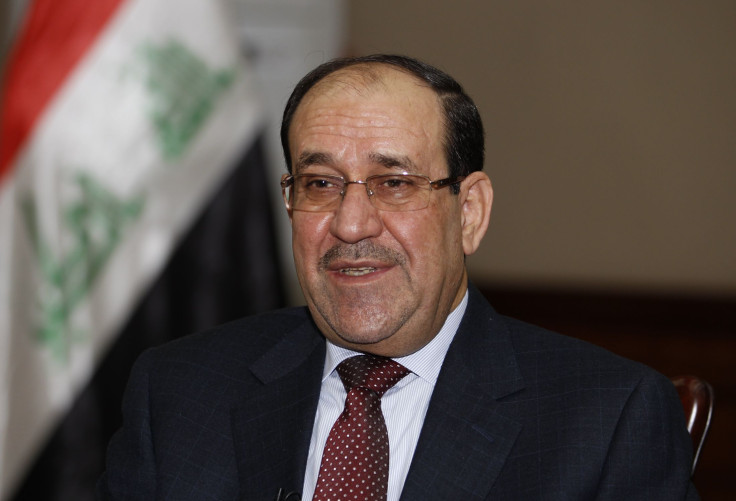Ex-Iraqi PM Nouri Al-Maliki Isn't 'Aiming' For Re-Election But 'Won't Decline' An Offer

Former Iraqi Prime Minister Nouri al-Maliki denied he was “aiming” for re-election but said in an interview with the Associated Press Monday he would not “decline” if the opportunity arose. Maliki’s resignation was an important step toward formation of an inclusive Iraqi government, an essential part of fighting the Islamic State group.
“If the Iraqi people decide to elect me, ... I won't decline," Maliki told the AP. "I was not willing to be [prime minister] but when the job was imposed upon me -- I stepped up to the call. But if asked personally whether I am aiming to [become prime minister] -- no. I am not."
Maliki stepped down in August in favor of a more unified and stable Iraqi government under current Prime Minister Haider al-Abadi. He now shares the title of vice president with two others and leads the Islamic Dawa party, a Shiite political party that also includes Abadi. Maliki’s increased involvement in the government, or any plans for re-election, could strain Abadi’s efforts to unify Iraq, and seriously hinder the campaign to eradicate ISIS militants from the country.
In his brief time in office, Abadi has reshuffled his cabinet to include both Sunni and Kurdish politicians to unify a country stricken by sectarian violence. Consequently, Abadi secured additional U.S. aid to fight militant groups and prompted President Barack Obama to launch an air campaign to fight the group formerly known as ISIS, which had taken over parts of Iraq.
ISIS was able to seize large parts of Iraq in June so quickly in part because they were up “against a house of cards, a state structure weakened by accumulated Sunni grievances,” the International Crisis Group has said.
The fate of Iraq now largely lies in the ability to gain allegiance from Sunni tribes in the fight against ISIS. However, many are still skeptical of the Iraqi government and Maliki in particular. ISIS has also stepped up their recruiting efforts to try to win over Iraq’s tribesman, most recently in the oil-rich city of Kirkuk.
For the last few weeks Maliki has slowly inched his way back into the political spotlight by stepping up his public appearances and denying that widespread Sunni discontent during his time in office contributed to the rise of Sunni militant groups in the country.
“Maliki is still dreaming, and this is going to kill him,” Ali Dabbagh, Maliki’s former spokesperson who now opposes him told the Wall Street Journal. “I think finally he should accept the reality. This is politics and this is like a wheel, down and up, and you are down. I don’t think that anybody would allow you to come up -- ever.”
Maliki was elected in 2006, two years into the U.S. intervention in Iraq. He began a violent crackdown on Iraq’s Sunni population under the pretense of eradicating al Qaeda militants almost immediately.
As Iraq spiraled into sectarian violence, Sunni tribes took arms to defend themselves and the government’s response grew more violent. At first, Maliki’s targeting of Sunnis was kept under wraps but the situation reached the point of no return when he attempted to arrest Sunni Vice President Tareq al-Hashimi in 2011. Hashimi fled to Turkey.
Soon after the attempted arrest, black flags belonging to al Qaeda in Iraq, the group that would later become the Islamic State of Iraq and Syria (ISIS), began to pop up in protests. ISIS marketed itself as the defender of Iraq’s Sunni population, and with no one else to turn to, many joined the militant group. In June 2014, just a month before Maliki’s resignation, ISIS swept through the largely Sunni city of Mosul.
“We would work with the devil,” Seif Zaad, a Sunni Iraqi who fled ISIS advances, told Newsweek in June. “But not with Maliki. If Maliki goes, everything would be perfect.” He added he thought ISIS was simply Sunnis “trying to protect themselves.”
© Copyright IBTimes 2024. All rights reserved.






















